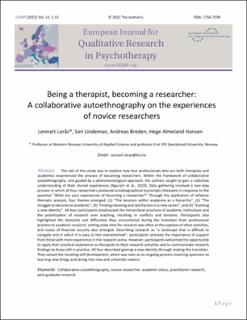| dc.contributor.author | Lorås, Lennart | |
| dc.contributor.author | Lindeman, Sari Kaarina | |
| dc.contributor.author | Breden, Andreas | |
| dc.contributor.author | Hansen, Hege Almeland | |
| dc.date.accessioned | 2023-01-12T13:21:22Z | |
| dc.date.available | 2023-01-12T13:21:22Z | |
| dc.date.created | 2022-01-11T11:43:40Z | |
| dc.date.issued | 2022 | |
| dc.identifier.citation | European Journal for Qualitative Research in Psychotherapy (EJQRP). 2022, 12, 1-12 | en_US |
| dc.identifier.issn | 1756-7599 | |
| dc.identifier.uri | https://hdl.handle.net/11250/3043092 | |
| dc.description.abstract | The aim of this study was to explore how four professionals who are both therapists and academics experienced the process of becoming researchers. Within the framework of collaborative autoethnography, and guided by a phenomenological approach, the authors sought to gain a collective understanding of their shared experiences (Ngunjiri et al., 2010). Data gathering involved a two-step process in which all four researchers produced autobiographical transcripts (datasets) in response to the question “What are your experiences of becoming a researcher?” Through the application of reflexive thematic analysis, four themes emerged: (1) “The tensions within academia as a hierarchy”, (2) “The struggle to become an academic”, (3) “Finding meaning and satisfaction in a new career”, and (4) “Evolving a new identity”. All four participants emphasised the hierarchical structure of academic institutions and the prioritization of research over teaching, resulting in conflicts and tensions. Participants also highlighted the demands and difficulties they encountered during the transition from professional practice to academic research: setting aside time for research was often at the expense of other activities, and issues of financial security also emerged. Describing research as “a landscape that is difficult to navigate and in which it is easy to feel overwhelmed”, participants stressed the importance of support from those with more experience in the research arena. However, participants welcomed the opportunity to apply their practical experience as therapists to their research activities and to communicate research findings to those still in practice. All four described gaining a new identity through making the transition. They valued the resulting self-development, which was seen as an ongoing process involving openness to learning new things and diving into new and unfamiliar waters. | en_US |
| dc.language.iso | eng | en_US |
| dc.publisher | European Association for Integrative Psychotherapy | en_US |
| dc.relation.uri | https://ejqrp.org/index.php/ejqrp/article/view/140 | |
| dc.rights | Attribution-NonCommercial-NoDerivatives 4.0 Internasjonal | * |
| dc.rights.uri | http://creativecommons.org/licenses/by-nc-nd/4.0/deed.no | * |
| dc.subject | post-graduate research | en_US |
| dc.subject | practitioner research | en_US |
| dc.subject | academic status | en_US |
| dc.subject | novice researcher | en_US |
| dc.subject | collaborative autoethnography | en_US |
| dc.title | Being a therapist - becoming a researcher: A collaborative autoethnography study | en_US |
| dc.type | Peer reviewed | en_US |
| dc.type | Journal article | en_US |
| dc.description.version | publishedVersion | en_US |
| dc.rights.holder | © 2022 The Author/s | en_US |
| dc.source.pagenumber | 1-12 | en_US |
| dc.source.volume | 12 | en_US |
| dc.source.journal | European Journal for Qualitative Research in Psychotherapy (EJQRP) | en_US |
| dc.identifier.cristin | 1978184 | |
| cristin.ispublished | true | |
| cristin.fulltext | original | |
| cristin.qualitycode | 1 | |

